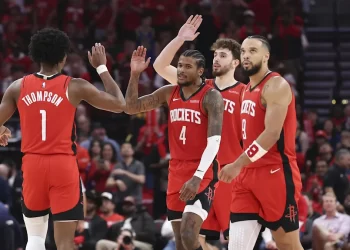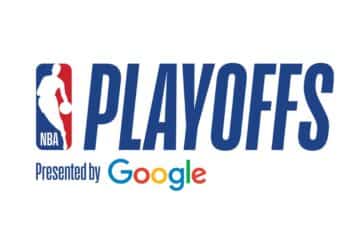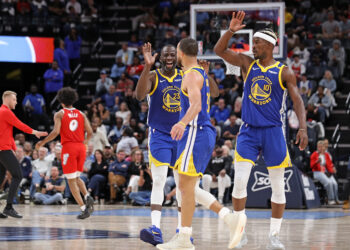By: Jeffrey Newholm
The first time, Usian Bolt was electric in bolting past his competition in the Olympics. The second time was still exciting, but not quite so novel. And then there was this summer’s 100 meters. By now the whole world watching expected Bolt to win. So did all of Bolts’ competitors. So did Bolt himself. Sure enough, Bolt won. It had gotten to the point there was almost no point in watching Olympic Track and Field anymore the outcome was so predictable. And I worry that, in the NBA, we’ve arrived in the same place. I’ve yet to find a single expert who predicts anything except a third straight Cavs-Dubs finals, and could only find one who thinks the Cavs can win once the finals come. The NBA’s new double dynasty threatens to sap all the excitement and unpredictably out of pro basketball. I think there are three main questions this predicament rises: how did we get here? Why exactly is it such a big problem? And what steps can be taken to solve it?
First, I’ll take a quick look at the East and West conferences to survey how this gross imbalance of power came to be. The extreme top-heaviness in the East started when Lebron famously took his talents to South Beach in 2011, forming a dynasty with Dwayne Wade, Chris Bosh and himself. After four years of hegemonic dominance, Lebron scampered back to Cleveland, who rather conveniently had the top draft pick. Ownership did some wheeling and dealing to get Kevin Love and get a coach Lebron liked better, and the Cavs have claimed the last two Finals spots, bringing the “king’s” Finals streak to six. The Cavs usually only have the third or fourth best record in the league, but the East is pretty much a power vacuum, with no challengers legitimately talented enough to beat Cleveland four out of seven times in a playoff series. Boston or Toronto could play the Cavs tough, but it’s very hard to see them actually winning the series. Certainly Cleveland won’t have any trouble making the east finals in the first place. But the East has long been the lesser of the two conferences; what’s become of the West is even more shocking.
The West used to be hyper-competitive, with sometimes six teams having records well above ,500. The Dubs in 2014 were a healthy 51-31, but this was only good for the #6 seed and a rather quick playoff exit. The team dumped Mark Jackson as coach and hired Steve Kerr (who rather wisely passed on the Knicks opening). What happened next was stunning: the team rocketed to the NBA title the next year, and last year set a record with 73 wins behind a barrage of threes. The only team that really gave the dubs a tough time was the Thunder, and Kevin Durant decided after the season to ditch his team and make the dubs even better. With the Spurs now getting rather long in the tooth, a playoff field that was once anyone’s game is now about as unpredictable as a wager on where the sun will rise tomorrow. Between the power vacuum in the east and the absurd level of talent on Golden State’s roster, it’s easy to see why no one is willing to go out on a limb with a dark horse-even a #2 seed is considered a dark horse this year. So with this picture clear, I’ll move on to the next question: what exactly is so concerning about all of this?
When one takes a look at the picture of things in the NFL, we see a league where, as Bert Bell said in the ’50s, and remains true to the current day, any team can beat any other team on any given Sunday. Even the Patriots, the most consistently excellent team in the league, have managed to win only one Super Bowl the last ten years, and it took some good luck to accomplish even that much. The NFL nets billions for its players and executives, and I think complaints about ratings being down this year are due from the fact that they couldn’t possibly go up any higher. But if the NBA becomes stuck with an imbalance of power, it could bode ill for the long run. Consider women’s college basketball to see the danger of a double dynasty. After the Vols won the title in 2008, the Vols had eight titles, the Huskies had five, and the next closest team had two. Since then the Vols have fallen on tough times and haven’t returned to the Final Four. The Huskies, meanwhile, have been to eight Final Fours in a row, won six titles, completed four perfect seasons and take a 75 game winning streak into next season. The 2016 Final Four was held in a half full arena, had the lowest ratings in six years, and I can attest that many fans left the championship game at halftime. With no one able to challenge the Huskies anymore, their dominance is getting absurd. And the same could happen in the NBA. As I mentioned earlier, few think the Cavs can actually beat the dubs this year. Even more troubling, Lebron’s skills have started to shown signs of decline, and the Cavs’ talent may have peaked last year, when it still took a herculean comeback to win three games in a row. A double dynasty is bad enough, but having just the Dubs crush everyone would get old even faster. I believe I’ve established why the double dynasty is a concern for the long-term health of the league. Next, I’ll document three solutions that would bail the league out of this predicament.
- Someone else breaks it up: This would be the best and most noble solution. It’s anyone’s guess on who could rise up and do this, or which superstar could broker a third superteam, but this would be very beneficial in the long run. Having two teams set a high bar, and having someone else rise up and follow it, would increase the overall talent in the league, making for better ball.
- Playoff Realignment: The WNBA ditched conference affiliation for the playoffs this year, and it worked out very well. The two best teams happened to be in the same conference, but were still able to meet in the Finals, and the result was a thrilling five game series decided in the last five seconds. With charter flights for every team now and ample off days between playoff games, the conference model is obsolete in the NBA, and we could potentially have a more exciting playoff series with the Cavs just the #3 or 4 overall seed. The problem of the dubs just having too much talent, however, still wouldn’t be solved by this.
- Wait it out: This may seem like a worst-case scenario, but it’s a surefire solution to end any dynastic run. Consider the Celtics of the ’60s. They won eight titles in a row, and Bill Russel won 11 rings. The finals MVP award is called the Bill Russell MVP award. And yet few acknowledge the Celtic’s greatness today, and all the talk about “GOAT” is Michael Jordan vs. Lebron: sadly Russell isn’t even in the conversation. Time ultimately passed the Celtics by, and certainly will for the Cavs and Dubs as well. This isn’t the ideal solution, but all good things must come to an end-and a good thing for two teams may not be so good for the greater good of the league.
Let me conclude by saying that I love the NBA, and am speaking as a sympathetic fan. I just have some genuine concerns on the state of the game these last three years. But it’s important to keep in mind-this is sports we’re talking about. They’re naturally zany and unpredictable. There are no sure bets. The 2007 Patriots started 18-0, then got stunned on a helmet catch. Mighty Michigan lost to Appalachian State at home. My alma mater won 46 games in a row, then lost to an unranked team at home. While the double dynasty is less than ideal, always bear in mind the NBA is a show-it’s never been meant to be taken too seriously. No matter who wins, or how much drama (or lack thereof) there figures to be this year, we should all just do our best to enjoy the ride.
You can follow me on Twitter @JeffreyNewholm and our blog @NutsAndBoltsSP.


 NFL
NFL





Comments 1